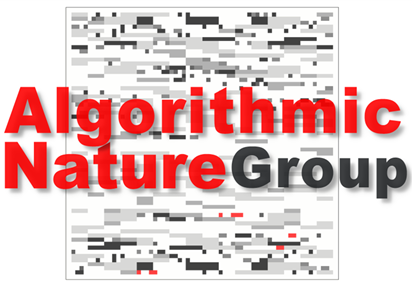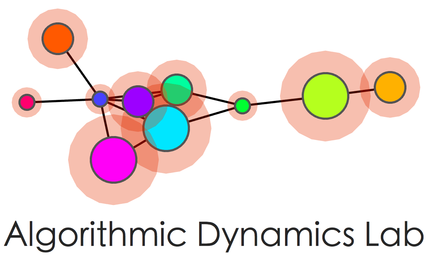The Online Algorithmic Complexity Calculator
v3.0
To know how to calculate your personal 'cognitive randomness'
ability (as shown in our widely covered article) read this.
The data produced by more than 3400 people trying to generate random data
can be found here (make sure to cite properly as explained here).
For the new functionality on network analysis read:
An Algorithmic Information Calculus for Causal Discovery and Reprogramming Systems
and also, very important, the Numerical Limitations subsection in the How It Works subpage.
The Online Algorithmic Complexity Calculator (OACC) is a powerful tool that provides estimations of algorithmic complexity (a.k.a. Kolmogorov-Chaitin complexity) (or $K$) and Algorithmic Probability for short and long strings and for 2-dimensional arrays better than any other tool, and estimations of Bennett's Logical Depth (or $LD$) for strings, hitherto impossible to estimate with any other tool. These 3 measures constitute the most powerful and universal algorithmic measures of complexity.
To estimate the complexity of long strings and large adjacency matrices, the OACC uses a method called $BDM$ which is based upon Algorithmic Probability. The estimation of complexity by $BDM$ is compatible with --but beyond the scope of-- lossless compression algorithms, which are so widely used to estimate $K$. Implementations of lossless compression are, however, entirely based upon Shannon entropy ($S$) (e.g. LZ, LZW, DEFLATE, etc) and thus cannot capture any algorithmic content beyond simple statistical patterns (repetitions). In contrast to lossless compression, $BDM$ not only considers statistical regularities but is also sensitive to segments of an algorithmic nature (such as sequences like $12345...$ or $246810...$), which Shannon entropy and lossless compression algorithms would only be able to characterize as having maximum randomness and the highest degree of incompressibility. Moreover, unlike Kolmogorov-Chaitin complexity (thanks to the Invariance Theorem), both Entropy and Entropy-based compression algorithms are not invariant to language choice and are therefore not robust enough to measure complexity or randomness (technical arguments and an example are be found here).
How to cite the OACC if you use it
For exhaustive or heavy calculations please do download or use alternatives such as our R implementation.
Otherwise the bandwidth will reach its limit and other people will not longer be able to use the calculator until the next monthly period.
The OACC is a project developed by the following labs:
Supported by:

As seen on the newsletters of the:



